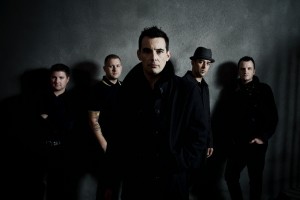
Street Dogs's raw, self-titled fifth album (released last month) is a tremendous improvement over 2008's overproduced "State of Grace."
The Street Dogs are a rare breed.
Not many punk bands can claim to honor the true roots of punk as well as the Street Dogs can, and not many bands know how to turn that spirit into great music.
Lead singer Mike McColgan was the original singer of fellow Boston punk group the Dropkick Murphys, before leaving to become a firefighter. However, in 2002 he again entered into the music scene, and formed the Street Dogs.
Hitting their high stride with 2006’s “Fading American Dream,” the Street Dogs combine working class ethos with high powered punk rock. With many bands jumping on power pop or radio-friendly rock band wagons, the Street Dogs have answered with this past month’s self-titled album, which manages to recreate and master that punk quality that can sometimes be so hard to define.
Recorded in the legendary Blasting Room in Fort Collins, Colo., the Street Dogs have captured political frustration and raw energy in a time where it could not be needed more.
It is an album of frustration and anger at the state of the world, but with small amounts of spirit and even Celtic influences that keep the album from ever running out of steam or over-doing its sound.
The album starts off with a cadence-like call to arms, drum roll and bag pipes included, before blasting apart into “Rattle and Roll,” a pure punk anthem if ever there was one. And from that track the album barely ever stops to take a breath, taking the listeners along with it.
Even though it may technically not be breaking new ground, the album is one of the finest pieces of true punk rock cloth available. Spanning 40 minutes in just 18 tracks, the album hits hard, fast and has all the vicious bite one expects from the band.
After their show in Buffalo last week, I was able to catch up with McColgan and get his thoughts on the new album.
“We probably racked up about 35 songs,” McColgan said. “So by the time we got up there to do our final round of pre-production tracks, we were pretty focused as a group and we knew the songs. I think, with [this album], as opposed to the other four records, we were knowing the songs better than we had before.”
And the band couldn’t have been happier with the result: “Ultimately, at the end of the day, I feel like it’s our best effort,” McColgan said. “And I don’t say that to be cocky. It’s just all five guys in the group feel that way.”
While albums are always a good representation of a band, it takes that extra mile to bring those songs alive on stage. The Dogs put on a sweaty and raucous live show that’s a fantastic testament to their fan dedication.
“When I wake up on the morning [on] the road … I’m always thinking about that last show,” McColgan said. “How we can play better, what can we do to make it better, you know, always analyzing and re-analyzing ourselves.”
And for McColgan, it’s the fans’ reactions that he sees night after night that keeps the band going.
“It’s really tough to describe the ecstasy I feel, it’s unreal. When you see the crowd singing our songs or losing their marbles, particularly the younger kids, when I see a scruffy little younger kid singing every word … I was that kid before. [It] reminds me of that and it reminds me that it’s still fucking alive and it can never be buried.”
The band’s connection with the fans doesn’t stop there. The Street Dogs break down the fan barrier, with McColgan often coming off the stage and sharing the mic with people in the crowd. At the Buffalo show, a crowd surfer was pummeled by security guards. Guitar player Tobe Bean III immediately stopped playing and ran from the stage, pulling the guards from the surfer and yelling at them to allow people to get on stage if they wanted to.
And at the end of the show McColgan stood by the door talking to fans and shaking hands as people left. If that isn’t dedication and loyalty, I’m not sure what is.
As for the continuing relevance of punk, McColgan has some words for everybody who has been decrying the genre’s death.
“I feel like it’s always going to be alive, just below or above the radar screen,” he said. “And if any pundit, or self appointed critic, or quote-unquote professional writer, you know, says [punk’s] dead, fuck you. That’s what I have to say … That’s how I feel, and we’ve always done things by our own terms, played, said, acted, however we want. We’re going to continue to do that. I don’t care what’s hot, I don’t care what’s not, I want to talk about substantive things in the music. I want to help out where I can.”
So maybe we just need a little more punk rock after all.
Clark is a member of the class of 2012.
